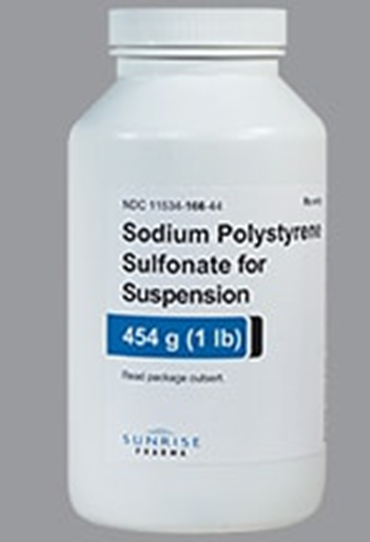A client with acute renal injury (AKI) weighs 110.3 pounds (50 kg) and has a potassium level of 6.7 mEq/L (6.7 mmol/L) is admitted to the hospital. Which prescribed medication should the nurse administer first?
Reference Range:
Potassium [3.5 to 5 mEq/L (3.5 to 5 mmol/L)]
Sodium polystyrene sulfonate 15 grams by mouth.
Sevelamer one tablet by mouth.
Calcium acetate one tablet by mouth.
Epoetin alfa, recombinant 2,500 units subcutaneously.
The Correct Answer is A
Choice A reason: Sodium polystyrene sulfonate is a medication that binds to excess potassium in the gastrointestinal tract and removes it from the body through feces. It is used to treat hyperkalemia, which is a high level of potassium in the blood. Hyperkalemia can cause cardiac arrhythmias and muscle weakness, and it is a common complication of AKI. Therefore, this medication should be administered first to lower the potassium level and prevent life-threatening complications.

Choice B reason: Sevelamer is a medication that binds to phosphorus in the gastrointestinal tract and removes it from the body through feces. It is used to treat hyperphosphatemia, which is a high level of phosphorus in the blood. Hyperphosphatemia can cause bone loss and soft tissue calcification, and it is a common complication of chronic kidney disease (CKD). However, it is not an urgent issue in AKI, and it does not affect the potassium level.
Choice C reason: Calcium acetate is a medication that also binds to phosphorus in the gastrointestinal tract and removes it from the body through feces. It has the same effect and indication as sevelamer, but it also provides calcium supplementation. However, it is not an urgent issue in AKI, and it does not affect the potassium level.
Choice D reason: Epoetin alfa, recombinant is a medication that stimulates the production of red blood cells in the bone marrow. It is used to treat anemia, which is a low level of hemoglobin or red blood cells in the blood. Anemia can cause fatigue, weakness, and shortness of breath, and it is a common complication of CKD and AKI. However, it is not an urgent issue in AKI, and it does not affect the potassium level.
Nursing Test Bank
Naxlex Comprehensive Predictor Exams
Related Questions
Correct Answer is C
Explanation
Choice A reason: An abdominal catheter is used for peritoneal dialysis, not hemodialysis. Hemodialysis requires access to a large blood vessel, usually in the arm or leg.
Choice B reason: Routine medications may need to be adjusted or avoided before or after hemodialysis, depending on their effects on blood pressure, fluid balance, and electrolytes.
Choice C reason: Insulin dosage may need to be reduced during hemodialysis because insulin is removed by the dialyzer and blood glucose levels may drop. This is the correct statement to include in client education.
Choice D reason: Potassium-rich foods should be limited in the diet of clients with chronic kidney disease and hemodialysis, because potassium can build up in the blood and cause cardiac arrhythmias.
Correct Answer is B
Explanation
Choice A reason: Obtaining a soft diet for the client is not the best initial nursing action for a client with chemotherapy-induced mucositis who is describing soreness of the tongue and oral issues. A soft diet can help reduce the irritation and discomfort of the oral mucosa, but it does not address the underlying cause of the inflammation and infection. The nurse should first assess the client's oral hygiene and provide appropriate interventions to prevent further complications.
Choice B reason: Encouraging frequent mouth care is the best initial nursing action for a client with chemotherapy-induced mucositis who is describing soreness of the tongue and oral issues. Frequent mouth care can help prevent or reduce the severity of mucositis by removing plaque, bacteria, and debris from the oral cavity, and by moisturizing and soothing the oral tissues. The nurse should instruct the client to use a soft toothbrush, a mild toothpaste, and a saline or bicarbonate rinse at least four times a day, and to avoid alcohol, tobacco, spicy, acidic, or hot foods and beverages.
Choice C reason: Cleansing the tongue and mouth with swabs is not the best initial nursing action for a client with chemotherapy-induced mucositis who is describing soreness of the tongue and oral issues. Swabs can be abrasive and damaging to the oral mucosa, especially if they are dry or contain alcohol or hydrogen peroxide. Swabs can also increase the risk of bleeding, infection, and ulceration of the oral tissues. The nurse should use a soft toothbrush or a gentle sponge to clean the tongue and mouth.
Choice D reason: Administering a topical analgesic per protocol is not the best initial nursing action for a client with chemotherapy-induced mucositis who is describing soreness of the tongue and oral issues. A topical analgesic can provide temporary relief of pain and discomfort, but it does not address the underlying cause of the inflammation and infection. The nurse should first assess the client's oral hygiene and provide appropriate interventions to prevent further complications. The nurse should also monitor the client's response to the analgesic and report any adverse effects or inadequate pain control.
Whether you are a student looking to ace your exams or a practicing nurse seeking to enhance your expertise , our nursing education contents will empower you with the confidence and competence to make a difference in the lives of patients and become a respected leader in the healthcare field.
Visit Naxlex, invest in your future and unlock endless possibilities with our unparalleled nursing education contents today
Report Wrong Answer on the Current Question
Do you disagree with the answer? If yes, what is your expected answer? Explain.
Kindly be descriptive with the issue you are facing.
